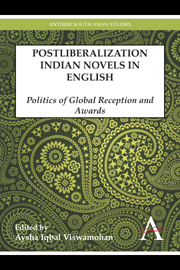Book contents
- Frontmatter
- Dedication
- Contents
- Acknowledgements
- Foreword
- Introduction
- 1 A Maverick Scholar: The Writings of Pankaj Mishra
- 2 Commodification of Post-Rushdie Indian Novels in English: Kunal Basu and the Politics of Decanonization
- 3 Marketing Lad Lit, Creating Bestsellers: The Importance of Being Chetan Bhagat
- 4 Vikas Swarup: Writing India in Global Time
- 5 The God of Small Things: Arundhati Roy's ‘Made in India’ Bookerboiler
- 6 Aravind Adiga: The White Elephant? Postliberalization, the Politics of Reception and the Globalization of Literary Prizes
- 7 ‘The Multinational's Song’: The Global Reception of M. G. Vassanji
- 8 ‘Shreds of Indianness’: Identity and Representation in Manju Kapur's The Immigrant
- 9 Inside ‘The Temple of Modern Desire’: Recollecting and Relocating Bombay
- 10 Tabish Khair: Marketing Compulsions and Artistic Integrity
- 11 Rohinton Mistry and the Canlit Imperative
- 12 Amitav Ghosh: The Indian Architect of a Postnational Utopia
- 13 Here, There and Everywhere: Vikram Seth's Multiple Literary Constituencies
- 14 Whatever Happened to Kaavya Viswanathan?
- 15 Of Win and Loss: Kiran Desai's Global Storytelling
- 16 Immigrant Desires: Narratives of the Indian Diaspora by Chitra Banerjee Divakaruni
- Glossary of Indian Words
- List of Contributors
- Bibliography
- Index
1 - A Maverick Scholar: The Writings of Pankaj Mishra
Published online by Cambridge University Press: 05 July 2013
- Frontmatter
- Dedication
- Contents
- Acknowledgements
- Foreword
- Introduction
- 1 A Maverick Scholar: The Writings of Pankaj Mishra
- 2 Commodification of Post-Rushdie Indian Novels in English: Kunal Basu and the Politics of Decanonization
- 3 Marketing Lad Lit, Creating Bestsellers: The Importance of Being Chetan Bhagat
- 4 Vikas Swarup: Writing India in Global Time
- 5 The God of Small Things: Arundhati Roy's ‘Made in India’ Bookerboiler
- 6 Aravind Adiga: The White Elephant? Postliberalization, the Politics of Reception and the Globalization of Literary Prizes
- 7 ‘The Multinational's Song’: The Global Reception of M. G. Vassanji
- 8 ‘Shreds of Indianness’: Identity and Representation in Manju Kapur's The Immigrant
- 9 Inside ‘The Temple of Modern Desire’: Recollecting and Relocating Bombay
- 10 Tabish Khair: Marketing Compulsions and Artistic Integrity
- 11 Rohinton Mistry and the Canlit Imperative
- 12 Amitav Ghosh: The Indian Architect of a Postnational Utopia
- 13 Here, There and Everywhere: Vikram Seth's Multiple Literary Constituencies
- 14 Whatever Happened to Kaavya Viswanathan?
- 15 Of Win and Loss: Kiran Desai's Global Storytelling
- 16 Immigrant Desires: Narratives of the Indian Diaspora by Chitra Banerjee Divakaruni
- Glossary of Indian Words
- List of Contributors
- Bibliography
- Index
Summary
One of the relatively recent signatures in contemporary Indian English writing, Pankaj Mishra, shot into the limelight with his work in fiction and nonfiction. Not much attention has been paid to him in the academic world for very long; in this paper my attempt has been to address this gap. But for a few reviews appearing in newspapers and literary journals (as the endnotes reflect), and the critical articles of Rahul Gairola (2003), Padmaja Challakere (2004), Jill Didur (2009) and Dwivedi (2009), no sustained efforts in the form of a book have been made to throw light on Mishra's works and achievements. These reviews and articles evoke a mixed response to his writings. More critical attention is called for because Mishra happens to be an author of the postliberalization period. But for his Butter Chicken in Ludhiana: Travels in Small Town India (1985), all his works appeared after 1991 – once the process of liberalization and globalization in India had begun, the resonance of which was particularly felt in metropolitan cities.
Pankaj Mishra was born in the small town of Kannauj, Uttar Pradesh, in 1969. He did his undergraduate course at the University of Allahabad, which had been a centre of attraction for his maternal family: ‘Three generations of my mother's family had gone to the University in Allahabad.’ Having spent three years at Allahabad (1985–88), Mishra proceeded to Benares in the winter of 1988 for an intensive self-guided reading.
- Type
- Chapter
- Information
- Postliberalization Indian Novels in EnglishPolitics of Global Reception and Awards, pp. 1 - 8Publisher: Anthem PressPrint publication year: 2013

